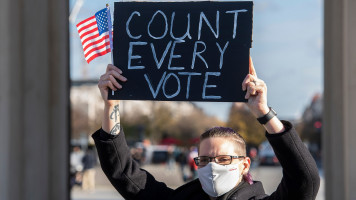Dubai-based broadcaster MBC ordered to take Turkish soaps off-air
Turkish dramas have been dropped by one of the Arab world's biggest television broadcasters, in the latest sign of an escalating rift between Turkey and the UAE.
Dubai-based MBC - which broadcasts across the Arab world - was ordered to remove all Turkish programmes from its channels. Among those affected are MBC Drama and MBC Masr, where Turkish dramas feature prominently.
Popular Turkish soap operas vanished suddenly from the channels' schedules Friday, with no announcement made by MBC or the UAE government about the decision.
Turkey and the UAE have been engaged in a bitter diplomatic war in recent months.
At least one local newspaper suggested the decision was based on Abu Dhabi's efforts to limit the reach of Ankara's "soft power" in the Arab world.
MBC spokesperson Mazen Hayek confirmed to Abu Dhabi-based daily The National that schedulers were ordered to remove Turkish dramas from its channels.
He did not confirm whether the instruction came from upper-management or the government.
"There is a decision that concerns several media outlets in many Arab countries that Turkish dramas are to be taken off air, including MBC," Hayek said. "That was from 1am Saudi Arabian time on March 2."
Dubai TV does not appear to have pulled the plug on Turkish dramas with historical drama SultanaKosem still showing up on the channel’s schedules this week.
Six shows on MBC have been affected by the ban with fans of Anta Watani dismayed that the period drama has been frozen on the 84th episode.
Turkish dramas became hugely popular in the Arab world, after the success of soap opera Noor, which hit the air waves in 2008.
Turkish producers managed to take advantage of the decline of Arab dramas with once popular Syrian television hit by the war in the country.
Hayek did not say how long the ban will be in place, but judging from his comments to the Emirati daily it could be come time.
"It could be an opportunity for all of us to produce premium Arabic dramas with more quality," he said.
Pan-Arab MBC has come to dominate television in the region with family entertainment, news, movies and music shows broadcast by the region's largest private media company.
Tensions between Ankara and Abu Dhabi have been ongoing for some time due to Turkey's ruling party's political Islamist roots and relations with Egypt's former Muslim Brotherhood government, Qatar and Iran.
The UAE has been eager to expand its influence in the region since a wave of pro-democracy revolutions hit the region during the Arab Spring.
It has done this by backing Egyptian dictator Abdel Fattah al-Sisi and renegade Libyan commander Khalifa Haftar, among others.
The rivalry heated up in December when UAE Foreign Minister Sheikh Abdullah bin Zayed al-Nahyan shared a tweet attacking an Ottoman-era commander who was referred to in the message as President Tayyip Recep Erdogan's ancestor.
Turkey responded by renaming an Ankara street where the UAE embassy is located after Fahreddin Pasha, the Ottoman official named in the foreign minister's tweet.
Leading Emirati official Anwar Gargash followed up saying the Arab world "would not be led by Tehran or Ankara".
The UAE - along with its partners Saudi Arabia, Egypt and Bahrain - have also launched a blockade on Turkey's regional ally Qatar, who have been angered by Al Jazeera's coverage of pro-democracy and Islamist movements during the Arab Spring.
Among the demands made by the quartet to end the blockade is that Qatar shutter Al Jazeera, al-Araby al-Jadeed and London-based The New Arab.
The UAE has also ordered Qatar to close a Turkish base in the Gulf state.
Qatar has rejected the claims and demands of the quartet but called for dialogue.





 Follow the Middle East's top stories in English at The New Arab on Google News
Follow the Middle East's top stories in English at The New Arab on Google News


![Algeciras port [Getty]](/sites/default/files/styles/image_330x185/public/75377010.jpeg?h=327453ef&itok=KfCFUEza)